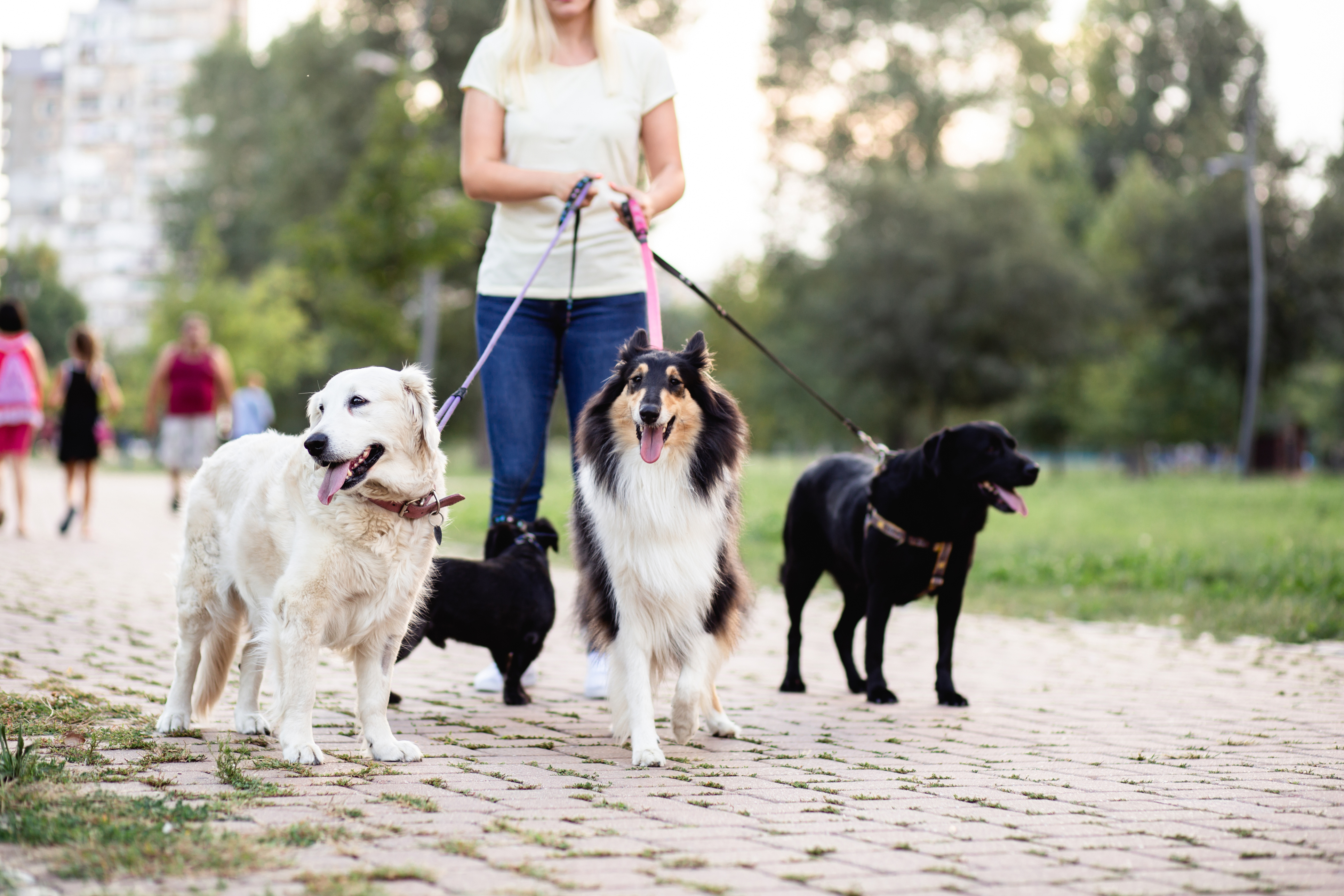vaccinations for dogs: what every dog owner should know
Vaccines play a key role in keeping your dog healthy, and they help protect the people and pets around you, too. By staying on top of your dog’s vaccines, you’re helping prevent the spread of serious diseases, some of which can even affect humans. We know it can feel overwhelming to figure out which vaccines your dog needs or how often they’re required, especially with so much information out there. That’s why we make it simple at Banfield. Our veterinary team is here to walk you through what’s recommended based on your dog’s age, lifestyle, and health.
Explore Optimum Wellness Plans for dogsWhy are vaccines important for dogs?
Vaccines help your dog build protection from the inside out. Dog vaccinations train their immune system to recognize and fight off certain diseases, so if they’re exposed, their body knows how to respond. Core dog vaccines protect against some of the most serious and contagious illnesses, including rabies, parvovirus, distemper, leptospirosis, and adenovirus. Others, like Bordetella (one of the components of kennel cough), and canine influenza, may be recommended based on where you live or how your dog spends their time.
Vaccinating your pet doesn’t just help them stay healthy, it helps protect other dogs in your community as well. When enough dogs are vaccinated, it creates something called herd immunity, which slows the spread of disease and keeps the entire pet population healthier.

Core and non-core dog vaccines
When it comes to protecting your dog’s health, there are two types of vaccines: core and non-core.

Core dog vaccines
Core vaccines are recommended for all dogs, regardless of age, breed, or lifestyle, because they protect against highly contagious and potentially life-threatening diseases. These include DHPP (which covers distemper, hepatitis, parvovirus, and parainfluenza), leptospirosis, and rabies, which is required by law in many areas.
Non-core dog vaccines
Non-core vaccines are recommended based on your pet’s individual needs. These may include protection against Bordetella (kennel cough), Lyme disease, and canine influenza — conditions that are more likely to affect dogs who visit groomers, attend daycare, spend time in wooded or tick-heavy areas, or live in regions where outbreaks are more common. Factors like your dog’s lifestyle, environment, travel habits, breed, and even local disease risks all play a role in deciding which non-core vaccines may be right for them. Your vet can help tailor a plan to help keep your dog protected.
Puppy and dog vaccine schedules
Getting your dog started on the right vaccine schedule is one of the most important steps you can take for their health.
Vaccines for puppies
Puppies typically begin their first round of vaccines at six to eight weeks of age, followed by a series of boosters every three to four weeks until they’re about 16 weeks old. This schedule helps build strong, lasting immunity as maternal antibodies fade. A typical puppy series includes the DHPP vaccine (distemper, hepatitis, parvovirus, and parainfluenza) at six to eight, 10 to 12, and 14 to 16 weeks, and rabies around 12 to 16 weeks, depending on local laws. Depending on your puppy’s lifestyle and environment, your vet may also recommend non-core vaccines like Bordetella (kennel cough), Lyme disease, or canine influenza during this period.
Vaccines for dogs
Once your dog has completed their initial series, they’ll need booster shots to maintain immunity. Most adult dogs receive DHPP boosters every one to three years and rabies every one to three years, depending on vaccine type and state regulations. Non-core vaccines are typically given annually if your dog’s lifestyle continues to put them at risk (e.g., frequent grooming, boarding, hiking, or travel).

Vaccines for older dogs
As dogs move into their senior years, your veterinarian may adjust their vaccine schedule based on overall health, activity level, and any chronic conditions. In some cases, fewer vaccines may be recommended, especially if your older dog has a history of strong vaccine responses or limited exposure to other dogs or public spaces.
Missing or skipping vaccines
If your dog misses a scheduled vaccine or you’re unsure about their vaccine history, don’t worry. It’s not too late. Your veterinarian can help restart or catch up on the schedule safely, often with a simple restart or a booster followed by regular timing. Keeping a consistent schedule going forward is the best way to maintain protection.
Vaccinations for certain dog breeds
While most dogs follow a similar vaccine plan, some breed-specific factors may apply. For example, sighthounds, toy breeds, or breeds prone to immune issues may benefit from a more tailored vaccine approach. Your veterinarian can guide you on what’s best for your dog’s breed, size, and overall health to ensure they’re protected without over-vaccinating.
Are dog vaccines safe?
Yes, dog vaccines are generally safe, and owners find the benefits of protecting their pet from serious illness far outweigh the risks. For most dogs, side effects (if any) are mild, temporary, and go away on their own within a day or two.
- Tired or less active
- Soreness at the injection site
- Mild fever
- Reduced appetite for a short period

- Facial swelling
- Hives
- Vomiting
- Difficulty breathing
- Collapse
These typically occur within minutes to a few hours after vaccination and require immediate veterinary attention. These types of reactions are uncommon, but it’s important to know the signs and act quickly if something feels off.
What to consider when vaccinating your dog
Some dogs may need extra care when planning their vaccination schedule. Small breed dogs, senior dogs, and pets with compromised immune systems may be more sensitive to certain vaccines or may benefit from a modified schedule. Your veterinarian can adjust the timing, dosage, or choice of vaccines to best support your dog’s individual health while still providing protection.
Is it safe to vaccinate your dog at home?
While it may be tempting to save money with DIY vaccine kits, these are not recommended. Improper storage, handling, or administration can reduce the vaccine’s effectiveness or put your pet at risk. Vaccines should always be given under the guidance of a veterinarian, who can ensure your dog gets the correct dose and monitor for any side effects. Working with a vet also ensures your dog take the right vaccines and stays on track with legal requirements.
How much do dog vaccinations cost?
The cost of vaccinating your dog can vary based on their age, health needs, and the types of vaccines they receive. On average, core vaccines like DHPP and rabies typically cost between $20 to $50 each. Non-core vaccines such as Bordetella, Lyme disease, or canine influenza may range from $30 to $70, depending on the brand and location. Puppies often need a series of vaccines, so the first year may be a bit more, while adult dogs usually require less frequent boosters.
While vaccine costs can add up, remember that they help prevent serious, and often expensive, illnesses that can lead to emergency visits, long-term treatment, or even hospitalization. Protecting your dog upfront is not only safer for their health, but often more affordable in the long run.
Banfield’s Optimum Wellness Plans® include most vaccinations as part of a broader package of preventive care services. These plans include routine exams, vaccines, diagnostic testing, and more. Plus, they help you budget for care with predictable monthly payments.
To get a more detailed look at the cost of dog vaccines in your area, enter your zip code below.

Get price estimate
FAQs for dog owners
What vaccines do dogs need?
Most dogs need core vaccines like DHPP (distemper, hepatitis, parvovirus, and parainfluenza), leptospirosis, and rabies. Depending on your dog’s lifestyle, they may also need non-core vaccines like Bordetella, Lyme, or canine influenza.
What is the DHPP vaccine?
DHPP is a combination vaccine that protects against four serious viruses: distemper, hepatitis, parvovirus, and parainfluenza. It’s considered a core vaccine and essential for all dogs.
What is the Bordetella vaccine?
The Bordetella vaccine helps protect against kennel cough, a contagious respiratory illness common in places like dog parks, daycares, and grooming salons. It’s often recommended for social or frequently boarded dogs. Please note that Bordetella is one of the most common pathogens that causes kennel cough, but your pet can still catch kennel cough from a different pathogen.
Can my vaccinated dog still get sick?
Vaccines greatly reduce the risk of serious illness, but no vaccine offers 100% protection. If a vaccinated dog does get sick, symptoms are usually shorter and milder.
How long do dog vaccines last?
It depends on the vaccine. Some last one year, others three years. Your vet will keep track and recommend boosters at the right time.
Are vaccines safe for small dogs?
Yes, vaccines are generally safe for small dogs. Your vet may tailor the vaccine schedule to match your dog’s size and health needs.
What happens if my dog throws up after shots?
Mild upset stomachs can happen, but vomiting may also be a sign of a reaction. Contact your vet right away, especially if symptoms continue or worsen.
Is it safe to get multiple vaccines at once?
Yes, most dogs can safely receive multiple vaccines in one visit. Your vet may space them out if your dog is very young, small, or has a history of reactions.
Should I vaccinate my indoor dog?
Yes, even indoor dogs need vaccines. Some diseases are airborne or carried in on shoes, and rabies vaccination is required by law in many areas.
Do senior dogs still need vaccines?
In most cases, yes. Your vet may adjust the schedule based on your dog’s age, health, and risk factors, but some protection should be maintained into their senior years.
Do dogs need vaccines every year?
Some vaccines require annual boosters, while others may last up to three years. Your vet can create a schedule based on your dog’s needs.
Are you ready to protect your dog?
Book your dog's vaccinations today. Find a Banfield vet near you
Published August 29, 2025
The information provided on this page is for informational purposes only and is not a substitute for professional veterinary advice. Always consult a veterinarian with any questions regarding your pet's health or medical condition. Never disregard or delay seeking professional veterinary advice based on information from this page.
 Mites and mange
Mites and mange Podcast - Not Just Fluff
Podcast - Not Just Fluff

